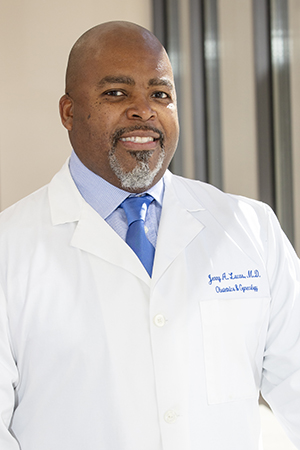What is an ectopic pregnancy?
Women's Care
St. Joseph’s/Candler OB/GYN Dr. Jerry Lucas explains this rare but extremely serious diagnosis
Although rare, it’s still something St. Joseph’s/Candler OB/GYN Dr. Jerry Lucas says is more common than he wants it to be. That’s because ectopic pregnancies do occur and can be extremely serious.
An ectopic pregnancy is a pregnancy that develops outside of the uterus. This happens in about two percent of all pregnancies. The most common place the embryo implants is in the fallopian tube; however, Dr. Lucas says an ectopic pregnancy can happen
anywhere in the abdomen where there is a blood source. 
In a normal pregnancy, the placenta establishes itself in the uterus and taps into the blood supply. Within the uterus, there’s plenty of room for the baby to develop and grow.
In an ectopic pregnancy that occurs within the fallopian tube, there may be enough blood supply very early in the pregnancy, but not enough to support a growing pregnancy that should be inside the uterus, Dr. Lucas says. Additionally, the fallopian tube is about the size and thickness of a couple noodles of linguine, he describes, and therefore can extend a bit but not to the full term. If an ectopic pregnancy is not discovered and the baby continues to grow in the fallopian tube, it can rupture and cause internal bleeding.
“That’s when it becomes a surgical emergency. You are bleeding inside, and you can actually die from it,” Dr. Lucas says. “So from that standpoint, it’s really important to identify an ectopic pregnancy as early as possible because you want to treat it before it gets to the seriousness of rupturing.”
How it’s diagnosed and who’s at risk
You find out you are pregnant like any other way – missed periods and/or a positive pregnancy test. But to determine if the embryo implanted properly in the uterus or if it’s ectopic elsewhere, your doctor may do a blood test and ultrasound, which uses high-frequency sound waves and a computer to show the location of the fetus.
A woman with an ectopic pregnancy may also experience irregular bleeding and pelvic or abdominal pain, especially on one side. If you think you could be pregnant and have any of these symptoms, Dr. Lucas stresses early detection.
That is especially true if you’ve experienced an ectopic pregnancy before, which is one of the biggest risk factors, Dr. Lucas says. Another risk factor is damage to the fallopian tubes or other organs in the pelvis from surgery or a sexually transmitted disease, as examples.
“Ectopic pregnancies are not extremely common, but particularly in those cases where there are those risk factors, it can be common,” Dr. Lucas says. “For instance, if you’ve had a prior ectopic pregnancy, you are anywhere from four to six times more likely to have another. It is really important to identify those women and check and make sure you know where that pregnancy is.”
If an ectopic pregnancy is detected, your physician will discuss your options with you, which may include surgery.
And if you do experience an ectopic pregnancy, there is still hope for a successful pregnancy. Yes, you are at higher risk, but it’s not impossible, Dr. Lucas says, who has been delivering babies for more than 25 years.